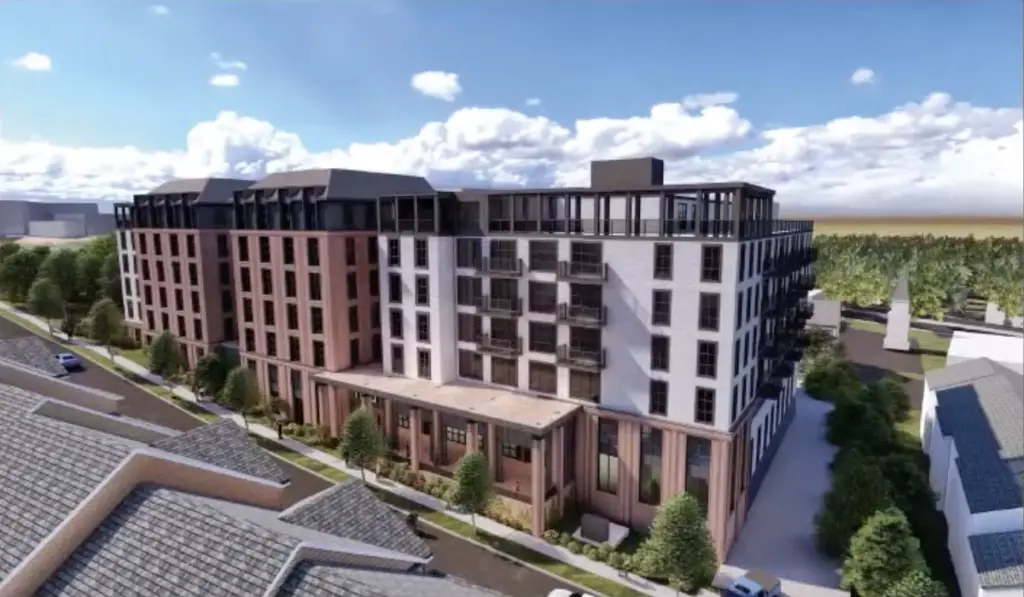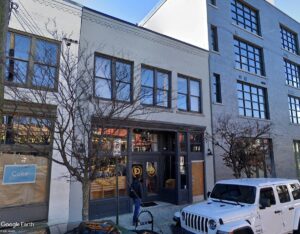During the Athens-Clarke County December 10 planning commission meeting, CORE Spaces’ representative Rodney King, and Antunovich Associates’ Jeff Zelisko provided a revised version of their previously-proposed and denied student housing development, at 155 Mitchell St. The motion to deny the proposal passed by a vote of five to four. It is unclear whether or not CORE Spaces will propose the project for the third time. What Now Atlanta reached out to CORE Spaces for comment.
Sign up now to get our Daily Breaking News Alerts
The proposal is for an eight-story building with 340 bedrooms split among 155 residential units as well as 209 parking spaces and first-floor commercial space — developers had previously proposed a ten-story retirement condominium at the site which sits across from townhomes and is located within a mile of Landmark Properties’ The Mark Athens development.
To address the concerns of the members of the commission as it pertains to the large swaths of empty retail space in many of the student housing complexes in Athens, Zelisko and King presented specific proposals as to how its project would be occupied in terms of uses. Even before the COVID-19 pandemic, many retail spaces have been empty, especially in student housing complexes including 909 Broad, The Mark Athens, and Uncommon Athens. The proposals presented included a “State of Fitness” (gym), “The Space” (co-working), “Infuse” (open coffee/bar), and “Collective & Co.” (work incubating space for smaller companies.) King stated to the planning commission that they had received commitments from tenants for all four concepts contingent on the site’s development which would bring a new commercial corridor to the currently underserved area.
Zelisko also drew attention to the new proposal’s differences compared to the previously approved condominium. The most significant differences were the greater number of units due to the development’s type and the reduction of commercial space.
Concerns raised by the planning commission focused on the narrow nature of Mitchell Street which is a one-lane, two-way roadway. Mitchell Street leads to Williams and Thomas Street which are also both one-lane, two-way streets not proximate to Oconee Street. However, the planning commission did recognize the changes that were made to the proposal’s design in order to make it more suitable to the Downtown cityscape. Planning commission members raised the point that the development would’ve been better suited to the city if it had been proposed earlier to prevent the other developments that have not melded well with the cityscape. Further, the members of the commission were unified around the location’s future uses as they agreed that the city would be better off without having more developments more proximate to the Downtown core.






2 Responses
This is mind boggling. They figured out how to incorporate the changes that the Athens-Clarke County Commissioners asked for and then the commissioners rejected them again and then moved the goal posts. Are they really so unsophisticated that they can’t clearly state what the county wants the first two times? This ineptitude is incredibly business and growth unfriendly. Athens needs to step up and learn how to work well.
Some points of clarification. First, the ACC planning commission (PC) makes recommendations to the regular commission. So, although it’s tempting to say that the “planning commission rejected/denied” a project, they actually can only recommend denial or approval (with or without conditions). It’s a small difference, but important. The mayor and commission take action on the PC’s recommendation, but they have the authority to agree or disagree with it.
Three and a half years ago (summer 2017), the planning commission recommended denial of an application for this site. It was a condominium tower that the developer planned to market as ‘senior living.’ The mayor and commission elected to go against the PC’s recommendation and approved the condo project (as is their right). However, the project never broke ground, for unknown reasons.
The application that your article is about is for a NEW planned development on the same site called “The Hub On Campus,” which is a student housing development. So, contrary to the other comment below this article, there was no “incorporating changes” and then coming back to moved goalposts. The PC does review each application twice, but the first time is to make comments only. These were two totally separate applications. In a close (5-4)vote, the planning commission recommended denial. The planning commission has not denied this application twice. They have recommended denial of two separate applications for planned developments at the 155 Mitchell Street site.
The ultimate fate of this project has yet to be determined. The mayor and commission discussed the application at their February 2, 2021 meeting and will vote on it at their March 2, 2021 meeting.